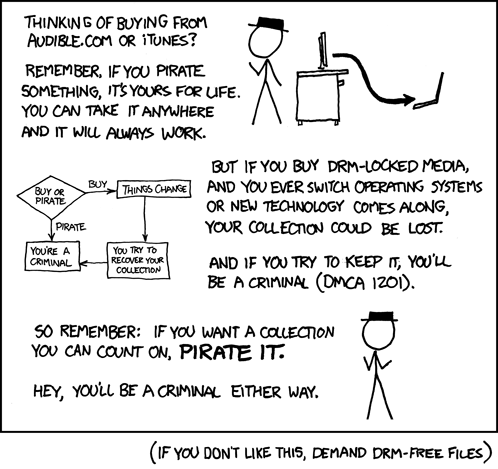I am a
bibliophile, or, to say it in plain English, a book lover. I have been collecting books since I was in first grade. I read books at high speed, which is both a blessing and a curse. A blessing, because I can squeeze useful information out of a book very quickly, and that's useful for my job, and for some of my hobbies. A curse, because when I travel one book is usually not enough to keep me busy for the whole travel, and I need to carry or buy more, with negative effects on the weight of my luggage and my on my back. Ten years ago I had a brief but intense experience with electronic books in a Palm hand held device. It didn't last long, though. The quality of ebooks and readers in that period was less than optimal, and I have left the matter rest for a while.
In the meantime, I kept collecting electronic books, mostly PDF editions of technical books that I keep in my laptop for quick reference. Reading them from cover to cover, though, is not a pleasant experience in a laptop. Ditto for reading fiction or essays. The laptop screen is not comfortable for such exercise.
Then, last year, I bough an
ebook reader.
That changed the whole business. Reading ebooks became very similar to reading paper books. The size of the screen and the ability of increasing font size makes your reading a pleasure. As for my back and luggage problems, that's solved hands down. The weight of the device is the same, no matter if I carry one ebook or one hundred.
Suddenly, the dozen of ebooks that I had kept idle in my laptop sprang to life, and I was able to read them like a paper book, easily, comfortably, and with pleasure.
I started buying more ebooks, both of fiction and of technical matters. The latter are especially welcome. Whenever I travel to conferences, I am tempted to buy some useful book, and then I regret when it burdens my backpack during the trip home, and fights for room on my overcrowded book shelves. No more of this. Now, when I visit a book booth at a conference, I simply take note of the interesting titles, and then I buy the ebooks at the publisher's site directly. If there is no ebook, I can easily convince me that the book is not really needed.
A few months ago there was some new development. My ebook reader's screen was faulty. It was showing a few unwanted lines at the bottom and the top of the screen, making it difficult to read menus. No big deal. I sent it to the manufacturer, which replaced the screen for free. The only trouble was that the replacement took three months! During that period, I experienced reading ebooks (to which I was by then addicted) with my Android phone, using a wonderful application named
Aldiko. The user friendliness of this app more than compensated for the smaller screen size, and I was able to read technical and fiction books with little problem. But I was missing the big screen. So the delay of the back shipment was partially responsible for the lowering of my defenses, when I entered an Apple store and I couldn't leave without a new iPad.
I felt guilty for a while, but the guilt disappeared in a matter of hours, when I loaded all my ebooks in the iPad, and saw what a difference a bigger and colorful screen does. Compared to the six inches of my ebook reader, the iPad is huge, and the reading is even easier and more pleasurable. I was hooked.
Since then, my personal library of ebooks has grown rapidly. I have bought 90 (yes, ninety) books from
O'Reilly, including many that I had already bought on paper, and now I am giving away to friends and libraries.
I need to spend a few words of praise for O'Reilly. In the jungle of book publishing, O'Reilly is the best and more user friendly publisher available. The quality of its books is excellent, the choice of catalog vast and modern, the service impeccable. There are other publishers that offer comparable quality (e.g.
the Pragmatic bookshelf or
Manning) but not the same rich catalog, or a similarly vast catalog (e.g.
Packt Publishing) but not the same quality.
If I have to note any negative points about O'Reilly, is that there is no wish list in their shop. So, for now, I am restricting my wishes to
my list on Amazon.

